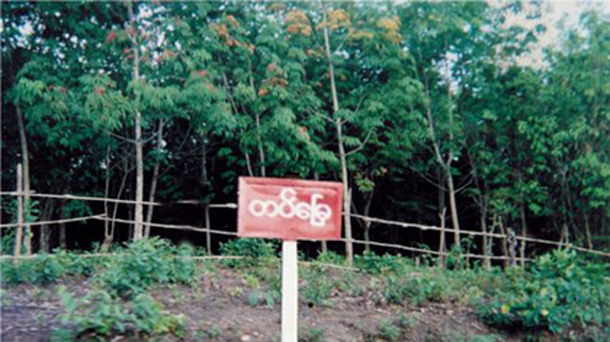RANGOON — A national lawmaker has called on Burma’s government to divest the military of its business interests in a bid to improve budget transparency and curb unjust land confiscations.
Speaking before the legislature on Wednesday, Banyar Aung Moe, a lawmaker from the All Mon Regions Democracy Party (AMDP), proposed that the state take over military-owned companies, which he said violated the rights of local people by frequently claiming land without compensation.
“Burma is transitioning to democracy right now, but this current system of taking land from the people is a violation of human rights,” he told The Irrawaddy on Thursday.
Military businesses bring in enormous profits each year, he said. If the businesses were transferred to state hands, the government could use the extra income to support its military budget, more transparently paying for the needs of military personnel.
He also said the government should stop funding the civil war in Kachin State and instead use those funds to provide for soldiers and their families, freeing up other money in the state budget for civil society.
Land grabs are common among military businesses in Burma. In an investigation last month, a committee from the Parliament’s Lower House found that the army had confiscated thousands of acres from local people nationwide.
The government justified the land grabs, saying soldiers could contribute to the military budget, thereby reducing the government’s contribution, by growing vegetables or raising livestock on the property.
“I told Parliament that this policy had negative consequences, because the military usually destroys the land it confiscates, meaning that the land cannot be used for farming anymore,” Banyar Aung Moe told The Irrawaddy.
The lawmaker said an army battalion confiscated land from members of his constituency in Mon State’s Ye Township after the New Mon State Party (NMSP) signed a ceasefire agreement with the government in 1995.
Local communities were forced to sign away their land rights, he said.
“The people were afraid of their guns; that’s why they signed the documents allowing the land grabs,” he said.
The Human Rights Foundation of Monland released a report a decade ago about land confiscations in Mon State and southern Burma after the 1995 ceasefire deal was reached.
The report, called “No Land to Farm,” said that within five years of the ceasefire, the Burmese armed forces had confiscated more than 7,700 acres from more than 370 farmers in Mon State and southern Burma.
Land grabs occurred most frequently in Ye Township, the report found, as thousands of Burmese troops were deployed to the area after the ceasefire and more than 15 new battalions were established in Mon State.
Farmers fled to refugee camps on the Thai border after losing their land, the report added. Their children were often pulled from schools in the move.
In other cases, the report said, farmers were forced to work for the army without pay or benefits.

















